- Home
- Katherine Paterson
Jacob Have I Loved Page 3
Jacob Have I Loved Read online
Page 3
It was nearly dark when school got out that afternoon. I rushed out before anyone could catch up with me and walked, not home, but across the length of the marsh on the one high path to the very southern tip of the island. The mud had a frozen brown crust and the cordgrass was weighed down by ice. The wind cut mercilessly across the barren end of Rass, but the hot shame and indignation inside me made me forget the wind as I walked. I was right. I knew I was right, so why had they all laughed? And why had Mr. Rice let them? He hadn’t even tried to explain what I meant to the others. It was only when I came to the end of the path and sat down upon a giant stump of driftwood and stared at the sickly winter moon waveringly reflected on the black water that I realized how cold I was and began to cry.
I should not forget that it was Caroline who came and found me there. Sitting on the stump, my back to the swamp and the village, I was crying aloud, so that I did not even hear the crunch of her galoshes.
“Wheeze.”
I jerked around, angry to be found out.
“It’s past time for your supper,” she said.
“I’m not hungry.”
“Oh, Wheeze,” she said. “It’s too cold to stay out here.”
“I’m not coming back. I’m running away.”
“Well, you can’t run away tonight,” she said. “There’s no ferry until tomorrow morning. You might as well come in and have supper and get warm.”
That was Caroline. I would hope for tears and pleadings. She offered facts. But they were facts I couldn’t argue with. It would be next to impossible to run away in a skiff at any time of year. I sighed, wiped my face on the back of my hand, and rose to follow her. Even though I could have walked the path blindfolded, I felt foolishly grateful for the homely bobbing comfort of her flashlight.
The watermen of Rass had their own time system. Four-thirty was suppertime winter and summer. So when Caroline and I walked in, our parents and grandmother were already eating. I expected a reprimand from my father or a tongue-lashing from my grandmother, but to my relief they simply nodded as we came in. Mother got up to bring us some hot food from the stove, which she put before us when we had washed and sat down. Caroline must have told them what had happened at school. I was torn between gratitude that they should sympathize and anger that they should know.
The school concert was Saturday night. Sunday was the only day the men did not get up before dawn, and therefore Saturday night was the only night anyone of the island would consider spending in a frivolous manner. I didn’t want to go, but it would have been harder to stay away and imagine what people were saying about me than to go and face them.
The boys had helped Mr. Rice rig up footlights, really a row of naked bulbs behind reflectors cut from tin cans, but they gave the tiny stage at the end of the gymnasium a magical distance from the audience. As I stood there on the stage floor in front of the risers, I could barely make out the familiar features of my parents in the center of the second row of chairs. I felt as if those of us on the stage were floating in another layer of the world, removed from those below. When I squinted my eyes, the people all blurred like a film that has jumped the sprockets and is racing untended through the machine. I think I sang most of the program with my eyes squinted. It was a very comforting feeling thus to remove myself from the world I imagined was laughing at me.
Betty Jean Boyd sang the solo for “O Holy Night,” and I hardly flinched when she went flat on the first “shining.” Betty Jean was considered to have a lovely voice. In any other generation on Rass she would have been worshiped for it, flat as it was, but in my day on Rass, everyone had heard Caroline sing. No one should have had to bear that comparison. Poor Betty Jean. I was puzzled that Mr. Rice should give her this solo. Caroline had sung it last year. Everyone would remember. But this year Mr. Rice had chosen a different solo for Caroline, a very simple one. I had been angry the first time he had sung it over for us. Caroline’s voice, after all, was our school treasure. Why had he given the showy song to Betty Jean and a strange thin melody to Caroline?
Now Mr. Rice left the piano and stood before us, his arms tense, his long fingers slightly curved. His dark eyes traveled back and forth, willing every eye to meet his. There were a few polite coughs from the shadowy darkness behind him. It was time. In just a few seconds it would begin. I didn’t dare to shift my gaze from Mr. Rice’s face to Caroline’s head, two rows behind and to the right of me in the back row, but my stomach knotted for her.
Mr. Rice’s hands went down, and from the center of the back row Caroline’s voice came suddenly like a single beam of light across the darkness.
I wonder as I wander out under the sky
Why Jesus the Savior did come for to die
For poor on’ry people like you and like I
I wonder as I wander—out under the sky.
It was a lonely, lonely sound, but so clear, so beautiful that I tightened my arms against my sides to keep from shaking, perhaps shattering. Then we were all singing, better than we had all night, better than we ever had, suddenly judged, damned, and purged in Caroline’s light.
She sang once more by herself, repeating the words of the first verse so quietly that I knew surely I would shatter when she went up effortlessly, sweetly, and, oh, so softly, to the high G, holding it just a few seconds longer than humanly possible and then returning to the last few notes and to silence.
A sharp report of applause suddenly rattled the room like gunfire. I jumped, first startled by the sound and then angered. I looked from the dark noisy blur to Mr. Rice, but he was already turning to take a bow. He motioned Caroline to step down and come forward, which she did. And when she turned to go back to her place, I was disgusted to see her dimpled and smiling. She was pleased with herself. It was the same expression she wore when she had thoroughly trounced me in checkers.
When we left the gymnasium, the stars were so bright, they pulled me up into the sky like powerful magnets. I walked, my head back, my own nearly flat chest pressed up against the bosom of heaven, dizzied by the winking brilliance of the night. “I wonder as I wander…”
Perhaps I would have drowned in wonder if Caroline, walking ahead with my parents, had not turned and called my name sharply. “Wheeze, you better watch out walking that way,” she said. “You’re likely to break your neck.” She had now moved beyond my parents in the narrow street and was walking backward, the better, I suppose, to observe me.
“Better watch out yourself,” I snapped, annoyed and embarrassed to be so yanked away from the stars. I realized suddenly how cold the wind had become. She laughed merrily and, still walking backward, doubled her speed. She was not likely to run into anything. She never stumbled or bumped into things. That, she seemed to be saying, was what I did—often enough for both of us.
Grandma was prone to arthritis and did not go out on a winter’s night, even to prayer meeting. So once home, we had to tell her all about the concert. Caroline did most of the talking, singing a snatch of this or that to remind Grandma of a carol she claimed never to have heard before.
“Did you sing the Holy Night one again?”
“No, Grandma, remember, I told you Betty Jean Boyd was doing that this year.”
“Why was that? She can’t half sing like you can.”
“Caroline sang a different one this year, Mother.” My mother was making cocoa for us and calling in a word here and there from the kitchen. “Betty Jean sounded very sweet.”
Caroline gave me a look and snorted out loud. I knew she was expecting me to contradict Momma, but I wasn’t going to. If Caroline wanted to be snobbish about Betty Jean, she could do it on her own.
Caroline had begun to imitate Betty Jean’s singing of “O Holy Night.” It was almost perfect, just a fraction flatter and shakier than Betty Jean’s voice had been, the o’s and ah’s parodies of Betty Jean’s pretentious ones. She ended the performance with a mournful shriek more than a little off pitch and looked around, grinning for her family’s approval.
<
br /> All the way through I had expected my parents to stop her, invoking, if nothing else, the nearness of the neighbors. But no one had. And now, she had finished and was waiting for our applause. It came in the form of a smile working at the firm corners of my father’s mouth. Caroline laughed happily. It was all she desired.
Surely Momma would protest. Instead she handed Grandma a cup to drink in her chair. “Here’s your cocoa, Mother,” she said. Caroline and I went to the table for ours, Caroline still smiling. I had a burning desire to hit her in the mouth, but I controlled myself.
That night I lay in bed with an emptiness chewing away inside of me. I said my prayers, trying to push it away with ritual, but it kept oozing back round the worn edges of the words. I had deliberately given up “Now I lay me down to sleep” two years before as being too babyish a prayer and had been using since then the Lord’s Prayer attached to a number of formula “God blesses.” But that night “Now I lay me” came back unbidden in the darkness.
Now I lay me down to sleep,
I pray the Lord my soul to keep.
If I should die before I wake,
I pray the Lord my soul to take.
“If I should die…” It didn’t push back the emptiness. It snatched and tore at it, making the hole larger and darker. “If I should die…” I tried to shake the words away with “Yea, though I walk through the valley of the shadow of death, I shall fear no evil, for behold, thou art with me…”
There was something about the thought of God being with me that made me feel more alone than ever. It was like being with Caroline.
She was so sure, so present, so easy, so light and gold, while I was all gray and shadow. I was not ugly or monstrous. That might have been better. Monsters always command attention, if only for their freakishness. My parents would have wrung their hands and tried to make it up to me, as parents will with a handicapped or especially ugly child. Even Call, his nose too large for his small face, had a certain satisfactory ugliness. And his mother and grandmother did their share of worrying about him. But I had never caused my parents “a minute’s worry.” Didn’t they know that worry proves you care? Didn’t they realize that I needed their worry to assure myself that I was worth something?
I worried about them. I feared for my father’s safety every time there was a storm on the Bay, and for my mother’s whenever she took the ferry to the mainland. I read magazine articles in the school library on health and gave them mental physical examinations and tested the health of their marriage. “Can this marriage succeed?” Probably not. They had nothing in common as far as I could tell from the questionnaires I read. I even worried about Caroline, though why should I bother when everyone else spent their lives fretting over her?
I longed for the day when they would have to notice me, give me all the attention and concern that was my due. In my wildest daydreams there was a scene taken from the dreams of Joseph. Joseph dreamed that one day all his brothers and his parents as well would bow down to him. I tried to imagine Caroline bowing down to me. At first, of course, she laughingly refused, but then a giant hand descended from the sky and shoved her to her knees. Her face grew dark. “Oh, Wheeze,” she began to apologize. “Call me no longer Wheeze, but Sara Louise,” I said grandly, smiling in the darkness, casting off the nickname she had diminished me with since we were two.
4
“I hate the water.”
I didn’t even bother to look up from my book. Grandma had two stock phrases. The first was “I love the Lord,” and the second, “I hate the water.” I had grown fully immune to both by the time I was eight.
“What time’s the ferry due?”
“The same time as always, Grandma.” I wished only to be left to my book, which was a deliciously scary one about some children who had been captured by a bunch of pirates in the West Indies. It was my mother’s. All the books were hers except the extra Bibles.
“Don’t be sassy.”
I sighed and put down my book and said with greatly exaggerated patience, “The ferry is due about four, Grandma.”
“Doubt but there’s a northwest wind,” she said mournfully. “Likely to be headed into the wind all the way in.” She rocked her chair slowly back and forth with her eyes closed. Or almost closed. I usually had the feeling she was watching through slits. “Where’s Truitt?”
“Daddy’s working on the boat, Grandma.”
She opened her eyes wide and sat up straight. “Not tonging?”
“Tonging’s done, Grandma. It’s April.” It was spring vacation, and here I was sitting all day with a cranky old woman.
She settled back. I thought she might tell me not to be sassy once more for good measure, but instead she said, “That ferry of Billy’s is too old. One of these days it’s going to sink right there in the middle of the Bay, and no one will find neither plank of it never again.”
I knew Grandma’s fears were idle, but they stirred up a little fuzz ball of fear in my stomach. “Grandma,” I said, as much to myself as to her, “it’s got to be okay. Government’s always checking it out. Ferryboat’s got to be safe or it won’t get a license. Government controls it.”
She sniffed loudly. “Franklin D. Roosevelt thinks he can control the whole Chesapeake Bay? Ain’t no government can control that water.”
God thinks he’s Franklin D. Roosevelt.
“What are you grinning about? Ain’t nothing to grin about.”
I pulled in my cheeks in an attempt to appear solemn. “You want some coffee, Grandma?” If I made her some coffee, it would distract her, and maybe she’d let me get back to my book in peace.
I slipped my book under the sofa cushion because it had a picture of a great sailing vessel on the front. I didn’t want Grandma upset because I was reading a book about the water. The women of my island were not supposed to love the water. Water was the wild, untamed kingdom of our men. And though water was the element in which our tiny island lived and moved and had its being, the women resisted its power over their lives as a wife might pretend to ignore the existence of her husband’s mistress. For the men of the island, except for the preacher and the occasional male teacher, the Bay was an all-consuming passion. It ruled their waking hours, sapped their bodily strength, and from time to tragic time claimed their mortal flesh.
I suppose I knew that there was no future for me on Rass. How could I face a lifetime of passive waiting? Waiting for the boats to come in of an afternoon, waiting in a crab house for the crabs to shed, waiting at home for children to be born, waiting for them to grow up, waiting, at last, for the Lord to take me home.
I gave Grandma her coffee and stood by while she noisily sucked in air and coffee. “Not enough sugar.”
I whipped the sugar bowl out from behind my back. She was clearly annoyed that I’d been able to anticipate her complaint. I could see on her face that she was trying to decide how to shift to something that I wouldn’t be prepared for. “Hmm,” she said finally in a squeaky little tone and spooned two heaping measures of sugar into her cup. She didn’t thank me, but I hadn’t expected thanks. I was so delighted to have outsmarted her that I forgot myself and began whistling “Praise the Lord and Pass the Ammunition” as I returned the sugar bowl to the kitchen.
“Whistling women and crowing hens never come to no good end.”
“Oh, I don’t know, Grandma, we might be terrific in a circus freak show.”
She was clearly shocked but couldn’t seem to put her finger on my specific sin. “Thou shalt not—thou shalt not—”
“Whistle?”
“Sass!” She almost screamed. I had clearly gotten the best of her, so I sobered to an elaborate caricature of humility. “Can I get you anything else, Grandma?”
She humphed and hemmed and slurped her coffee without answering, but as soon as I’d gotten my book again and was settled down on the couch and reading, she said, “It’s onto four o’clock.”
I pretended not to hear.
“Ain’t you going dow
n for the ferry?”
“I hadn’t thought to.”
“It wouldn’t hurt you to think a little. Your mother’s likely to have heavy groceries.”
“Caroline’s with her, Grandma.”
“You know full well that little child ain’t got the strength to carry heavy groceries.”
I could have said several things but all of them were rude, so I kept my mouth shut.
“Why do you look at me like that?” she asked.
“Like what?”
“With bullets in your eyes. Like you want to shoot me dead. All I want you to do is help your poor mother.”
It was useless to argue. I took the book upstairs and hid it in my underwear drawer. Grandma was less likely to poke around in there. She considered modern female undergarments indecent and if not precisely “of the devil,” certainly in that vicinity. I got a jacket, as the wind would be chilly, and went downstairs. When I reached the front door, the rocking stopped.
“Where you think you’re going?”
Fury began to swoosh up inside me. I kept my voice as flat as I could and said, “Down to meet the ferry, Grandma. Remember? You said I should go and help Momma bring back the groceries.”
She looked strangely blank. “Well, hurry,” she said at last, beginning to rock again. “I don’t favor waiting here by myself.”
A small crowd of islanders had come by foot or bicycle and were already waiting the arrival of the ferry. They greeted me as I approached, pulling the red metal wagon that we used for hauling.
“Your Momma coming in?”
“Yes, Miss Letty. She had to take Caroline to the doctor.”
Sympathetic looks all round. “That child has always been so delicate.”
It was useless to withhold information; besides, for once, I didn’t care. “She had an earache, and Nurse thought she ought to go have Dr. Walton check it.”

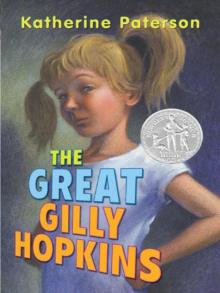 The Great Gilly Hopkins
The Great Gilly Hopkins Bridge to Terabithia
Bridge to Terabithia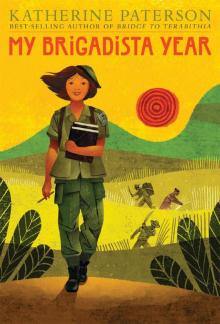 My Brigadista Year
My Brigadista Year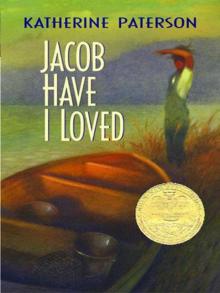 Jacob Have I Loved
Jacob Have I Loved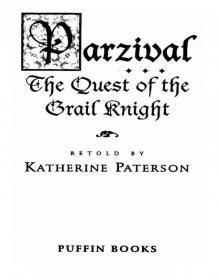 Parzival: The Quest of the Grail Knight
Parzival: The Quest of the Grail Knight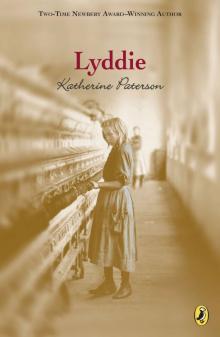 Lyddie
Lyddie The Day of the Pelican
The Day of the Pelican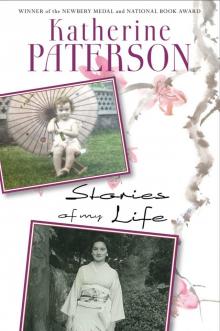 Stories of My Life
Stories of My Life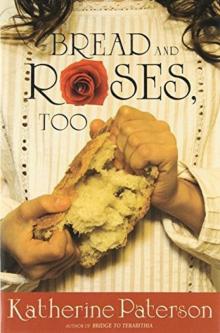 Bread and Roses, Too
Bread and Roses, Too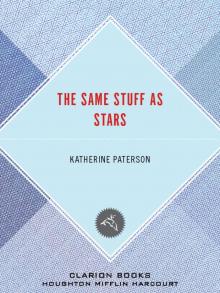 The Same Stuff as Stars
The Same Stuff as Stars